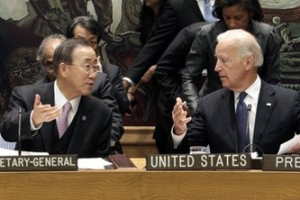Addressing the United Nations Security Council on Wednesday, U.S. Vice President Joe Biden expressed optimism about the future of Iraq but said the attacks against faith groups, including Iraqi Christians, were among security challenges in the country.
His comments were delivered at a high-level meeting in New York during which the Security Council passed resolutions that would lift key sanctions on the Republic of Iraq.
Biden, who chaired the special session, reported that the Iraqi forces "have proved themselves more than capable" of securing their own country. He said the frequency of violent attacks have reached its lowest level since the U.S. government entered Iraq in 2003.
More than 100,000 American troops have exited Iraq, he noted, as the remaining 50,000 troops work with the Iraqi government to advise and assist their efforts.
But the vice president stated that "Iraq faces further challenges on the road to security and prosperity."
"Attacks by extremists remain an unacceptable aspect of daily life in Iraq," said Biden.
"We’re particularly concerned about recent attempts to target innocents because of their faith, including both Christians and Muslims, and to lash out at security forces working to keep the country safe."
Religious communities, including Iraqi Christians, have found themselves the target of a recent wave of violent attacks. The biggest attack occurred on Oct. 31 when at least 58 people, mostly worshippers, were slain at a Catholic Church in Baghdad.
There are only about 600,000 Christians in Iraq now, down from about 1.2 million before the U.S-led invasion in 2003, by some estimates. More and more Christians continue to flee the to the Kurdistan region of northern Iraq to escape religious persecution.
The U.S. Commission on International Religious Freedom has called on the U.S. government to "redouble its efforts" on protecting the religious rights and safety of Iraqi Christians.
Earlier this week, the independent federal group issued a statement calling on the government to use the Security Council meeting to highlight the plight of Christians and other small religious minorities in Iraq.
Responding to Biden's comments made Wednesday, Elizabeth K. Cassidy, USCIRF Deputy Director for Policy and Research, told The Christian Post, "We were pleased that he mentioned that issue in his statement although it was a fairly general statement,"
"The tenor of the meeting there was on other issues. So we would still like to see the efforts of the U.S. and Iraqi government to concretely provide upgraded security and focused development opportunities there."
USCIRF has made three recommendations on how the U.S. can protect vulnerable religious communities in Iraq, including having U.S. troops collaborate with Iraqi military and police on providing security to areas where vulnerable populations reside and work.
The commission also urges the U.S. development assistance to prioritize areas where vulnerable communities are concentrated, including the Nineveh Plains area.
"We'd like to see dedicated, operated security for these particularly vulnerable communities, representative community policing, and that the U.S. development program prioritize minority areas," said Cassidy.
The USCIRF commissioner said that there is a real concern as to the existence of these religious groups, including Christians, Mandaeans and Yazidis, in Iraq since many have fled due to the ongoing violence.
"We think it would bad for the Iraqi future to lose these communities which have been part of Iraq for centuries," she said.
Meanwhile, during the surge of the deadliest attacks, leaders of 16 Christian political parties and groups have issued a call for greater protection. They recently met to discuss plans to form a self-governing Christian province in the Nineveh Plains in northern Iraq.
Critics, however, say the plan to isolate Christians in one area would only make them an easy target for terrorists.
Cassidy said USCIRF will continue to monitor the religious freedom issues in Iraq on an ongoing basis as it has done for years.
"There is still a lot more that the Iraqi government needs to do to protect the religious freedom for all of its people."



















